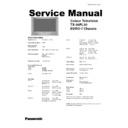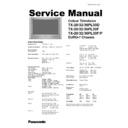Panasonic TX-36PL30 Service Manual ▷ View online
Colour Television
TX-36PL30
EURO-7 Chassis
SPECIFICATIONS
Power Source:
220-240V a.c., 50Hz
Power Consumption:
155W
Stand-by Power
Consumption:
Consumption:
2.8W
Aerial Impedance:
75
Ω
unbalanced, Coaxial Type
Receiving System:
PAL I, PAL-525/60 UHF
M.NTSC
NTSC (AV only)
M.NTSC
NTSC (AV only)
Receiving Channels:
UHF E21-E69
Intermediate Frequency:
Video/Audio
Video
Video/Audio
Video
39.5MHz
Audio
33.5MHz
32.95MHz (NICAM)
32.95MHz (NICAM)
Colour
35.07MHz (PAL)
Terminals:
AV1 IN
AV1 IN
Video (21 pin)
1V p-p 75
Ω
Audio (21 pin)
500mV rms 10k
Ω
RGB (21 pin)
AV1 OUT
Video (21 pin)
1V p-p 75
Ω
Audio (21 pin)
500mV rms 1k
Ω
AV2 IN
Video (21 pin)
1V p-p 75
Ω
Audio (21 pin)
500mV rms 10k
Ω
S-Video IN
Y: 1V p-p 75
Ω
(21-pin)
C: 0.3V p-p 75
Ω
AV2 OUT
Video (21 pin)
1V p-p 75
Ω
Audio (21 pin)
500mV rms 1k
Ω
Selectable output (21 pin)
AV3 IN
S-Video IN
Y: 1V p-p 75
Ω
(4-pin)
C: 0.3V p-p 75
Ω
Audio (RCAx2) 500mV rms 1Video
Video (RCAx2) 1V p-p 75
Video (RCAx2) 1V p-p 75
Ω
AV4 IN
Video (21 pin) 1V p-p 75
Ω
Audio (21 pin) 500mV rms 10k
Ω
S-Video IN
Y: 1V p-p 75
Ω
(21-pin)
C: 0.3V p-p 75
Ω
RGB (21 pin)
AV4 OUT
Video (21 pin) 1V p-p 75
Ω
Audio (21 pin)
500mV rms 1k
Ω
High Voltage:
32kV
±
1kV
Picture Tube:
W86LPX955X07 86cm
Audio Output:
Front Left/Right 2 x 20W
(Music Power)
8
Ω
Impedance
Digital Audio Input
Coaxial / Optical
Headphones:
8
Ω
Impedance
3.5mm
Accessories
supplied :
supplied :
Remote Control
2 x R6 (UM3) Batteries
2 x R6 (UM3) Batteries
Dimensions:
Height:
Height:
623mm
Width:
950mm
Depth:
580mm
Net weight:
78kg
Specifications are subject to change without notice.
Weights and dimensions shown are approximate.
Weights and dimensions shown are approximate.
NOTE: This Service Manual should be used in conjunction with
the EURO-7 Technical guide.
the EURO-7 Technical guide.
ORDER No. SM-01024
CONTENTS
SAFETY PRECAUTIONS..........................................................................................................................................................2
SERVICE HINTS .......................................................................................................................................................................3
ADJUSTMENT PROCEDURE AND FACTORY SETTINGS .....................................................................................................4
WAVEFORM PATTERN TABLE ...............................................................................................................................................5
ALIGNMENT SETTINGS...........................................................................................................................................................6
BLOCK DIAGRAMS ..................................................................................................................................................................7
PARTS LOCATION .................................................................................................................................................................13
REPLACEMENT PARTS LIST ................................................................................................................................................14
SCHEMATIC DIAGRAMS .......................................................................................................................................................30
CONDUCTOR VIEWS.............................................................................................................................................................38
SAFETY PRECAUTIONS
GENERAL GUIDE LINES
1. It is advisable to insert an isolation transformer in the
a.c. supply before servicing a hot chassis.
2. When servicing, observe the original lead dress in the
high voltage circuits. If a short circuit is found, replace
all parts that have been overheated or damaged by
the short circuit.
all parts that have been overheated or damaged by
the short circuit.
3. After servicing, see that all the protective devices
such as insulation barriers, insulation papers, shields
and isolation R-C combinations are correctly
installed.
and isolation R-C combinations are correctly
installed.
4. When the receiver is not being used for a long period
of time, unplug the power cord from the a.c. outlet.
5. Potentials as high as 33kV are present when this
receiver is in operation. Operation of the receiver
without the rear cover involves the danger of a shock
hazard from the receiver power supply. Servicing
should not be attempted by anyone who is not
familiar with the precautions necessary when working
on high voltage equipment. Always discharge the
anode of the tube.
without the rear cover involves the danger of a shock
hazard from the receiver power supply. Servicing
should not be attempted by anyone who is not
familiar with the precautions necessary when working
on high voltage equipment. Always discharge the
anode of the tube.
6. After servicing make the following leakage current
checks to prevent the customer from being exposed
to shock hazard.
to shock hazard.
LEAKAGE CURRENT COLD CHECK
1. Unplug the a.c. cord and connect a jumper between
the two prongs of the plug.
2. Turn on the receiver’s power switch.
3. Measure the resistance value with an ohmmeter,
3. Measure the resistance value with an ohmmeter,
between the jumpered a.c. plug and each exposed
metallic cabinet part on the receiver, such as screw
heads, aerials, connectors, control shafts etc. When
the exposed metallic part has a return path to the
chassis, the reading should be between 4M ohm and
20M ohm. When the exposed metal does not have a
return path to the chassis, the reading must be
infinite.
metallic cabinet part on the receiver, such as screw
heads, aerials, connectors, control shafts etc. When
the exposed metallic part has a return path to the
chassis, the reading should be between 4M ohm and
20M ohm. When the exposed metal does not have a
return path to the chassis, the reading must be
infinite.
LEAKAGE CURRENT HOT CHECK
1. Plug the a.c. cord directly into the a.c. outlet. Do not
use an isolation transformer for this check.
2. Connect
a
2k
Ω
10W resistor in series with an
exposed metallic part on the receiver and an earth,
such as a water pipe.
such as a water pipe.
3. Use an a.c. voltmeter with high impedance to
measure the potential across the resistor.
4. Check each exposed metallic part and check the
voltage at each point.
5. Reverse the a.c. plug at the outlet and repeat each of
the above measurements.
6. The potential at any point should not exceed
1.4V rms. In case a measurement is outside the limits
specified, there is a possibility of a shock hazard, and
specified, there is a possibility of a shock hazard, and
the receiver should be repaired and rechecked before
it is returned to the customer.
it is returned to the customer.
X-RADIATION WARNING
1. The potential sources of X-Radiation in TV sets are
the high voltage section and the picture tube.
2. When using a picture tube test jig for service, ensure
that the jig is capable of handling 33kV without
causing X-Radiation.
causing X-Radiation.
NOTE: It is important to use an accurate periodically
calibrated high voltage meter.
1. Set the brightness to minimum.
2. Measure the high voltage. The meter should indicate.
calibrated high voltage meter.
1. Set the brightness to minimum.
2. Measure the high voltage. The meter should indicate.
32kV ± 1Kv.
If the meter indication is out of tolerance, immediate
service and correction is required to prevent the
possibility of premature component failure.
If the meter indication is out of tolerance, immediate
service and correction is required to prevent the
possibility of premature component failure.
3. To prevent any X-Radiation possibility, it is essential
to use the specified tube.
HOT CHECK CIRCUIT
a.c. VOLTMETER
WATER PIPE
(EARTH)
TO INSTRUMENT’S EXPOSED
METALLIC PARTS
METALLIC PARTS
Fig. 1.
2k
Ω
10 Watts
2
SERVICE HINTS
How to remove the rear cover
1. Remove the 10 screws as shown in Fig.2.
LOCATION OF CONTROLS
3
Fig.2.
Fig.3.
SCREWS
SCREWS
G-Board
DG-Board
U-Board
Screen
H-Board
L-Board
Focus
DF-Board
A-Board
D-Board
ADJUSTMENT PROCEDURE
Item / Preparation
Adjustment/Confirmation
+B SET-UP
4. Receive a Window pattern.
5. Set the controls :-
5. Set the controls :-
Brightness
Minimum
Contrast
Minimum
Volume
Minimum
Confirm the following voltages.
A - Board
A1 Pin2
A1 Pin2
7.5
± 0.5V
IC1252 Pin2
2.5
±
0.25V
A1 Pin12
-20
±
0.5V
IC1251 Pin3
3.3
+0.3 / -0.2V
A1 Pin16
20
±
0.5V
IC3302 Pin3
12
±
0.6V
A2 Pin15
30
±
0.5V
IC2707 Pin3
8
±
0.4V
A2 Pin6
15
±
0.5V
L2707
(IC2708) 9
±
0.4V
A3 Pin4
15
±
0.5V
L2704
(IC2706) 5
±
0.2V
A3 Pin2
-15
±
0.5V
L2716
(IC2705) 3.3
±
0.2V
L2717
(IC2709) 3.3
±
0.2V
D – Board
TPD8-GND
TPD8-GND
7.5
±
0.5V
TPD9-TPD11
38.5
±
2V
TPD10-GND
15.5
±
1V
TPD13-GND
14.5
±
1V
TPD15-GND
144.8 ±
1V
TPD32-GND
209
±
10V
C864-GND
-15.5 ±
1V
D2 Pin15-GND
31
±
1V
CUT OFF
1. Receive a Window pattern.
2. Degauss the tube externally.
3. Set the TV into Service Mode 1.
4. Select Sub brightness mode.
2. Degauss the tube externally.
3. Set the TV into Service Mode 1.
4. Select Sub brightness mode.
To adjust Cutoff connect an oscilloscope to the Blue cathode. Adjust "Cutoff"
value using the "Yellow" and "Blue" buttons until the black level is 170V ± 5V,
press "STR" to store the value. Remove the oscilloscope.
Select Highlight/Lowlight mode press "5" to collapse the screen and adjust the
screen “VR” until the display is just visible, press "5" to return to service mode.
Using the "Yellow" and "Blue" buttons adjust until optimum picture white
balance is achieved, press "STR" to store the value. Select Sub Brightness
mode and adjust until optimum picture brightness is achieved.
value using the "Yellow" and "Blue" buttons until the black level is 170V ± 5V,
press "STR" to store the value. Remove the oscilloscope.
Select Highlight/Lowlight mode press "5" to collapse the screen and adjust the
screen “VR” until the display is just visible, press "5" to return to service mode.
Using the "Yellow" and "Blue" buttons adjust until optimum picture white
balance is achieved, press "STR" to store the value. Select Sub Brightness
mode and adjust until optimum picture brightness is achieved.
SELF CHECK
Self-Check is used to automatically check the bus lines and hexadecimal code of the TV set.
To get into Self-Check mode press the down (-/v) button on the customer controls at the front of the TV set, at the same time
pressing the STATUS button on the remote control, and the screen will show: -
To get into Self-Check mode press the down (-/v) button on the customer controls at the front of the TV set, at the same time
pressing the STATUS button on the remote control, and the screen will show: -
To exit Self-Check, switch off the TV set at the power button.
4
If the CCU ports have been checked and found to be incorrect or not located then " - - " will appear in place of "O.K.".
Factory use only
Sum
:
****
MEM
:
O.K.
GC1
:
O.K.
GC2
:
- -
VDU
:
O.K.
CIP
:
O.K.
RGB
:
O.K.
AVSW
:
O.K.
TUN1
:
O.K.
TUN2
:
- -
DAC1
:
O.K.
MSP
:
O.K.
DOLBY
:
- -
CODEC
:
- -
DAC2
:
- -
DAC3
:
- -
OPTION 1 :
OPTION 2 :
OPTION 3 :
OPTION 4 :
OPTION 5 :
OPTION 6 :
OPTION 7 :
OPTION 8 :
OPTION 9 :
OPTION 10:
OPTION 11:
OPTION 12:
OPTION 13:
Check :
OPTION 2 :
OPTION 3 :
OPTION 4 :
OPTION 5 :
OPTION 6 :
OPTION 7 :
OPTION 8 :
OPTION 9 :
OPTION 10:
OPTION 11:
OPTION 12:
OPTION 13:
Check :
TX-36PL30
0D
00
10
10
00
50
00
41
00
80
19
48
10
10
00
50
00
41
00
80
19
48
FA
CD


